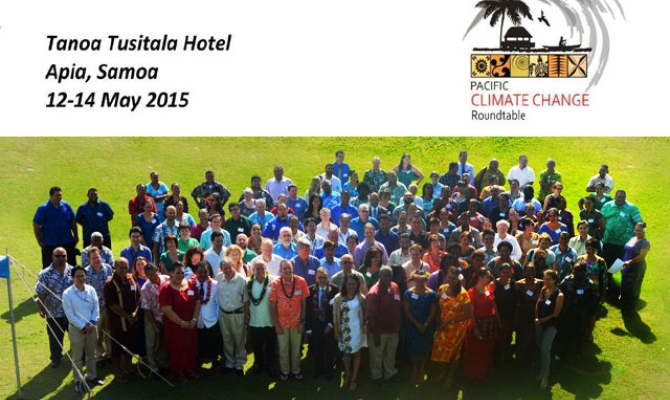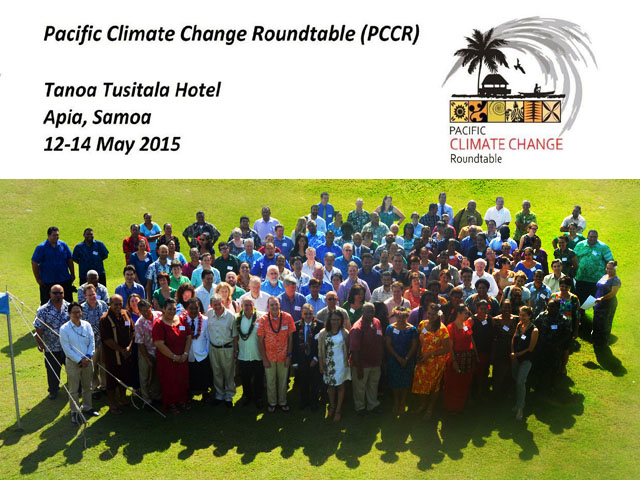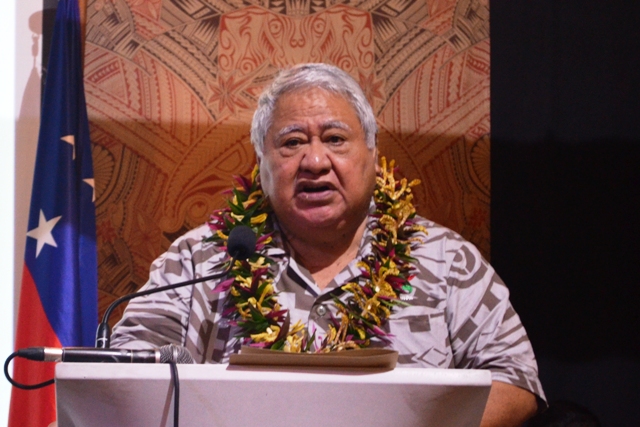
Climate Change Resilience
12 May 2015, Apia, Samoa, PCCR - Samoa is well on its way of meeting it’s 100 per cent goals on renewable energy by 2017, its Prime Minister Honourable Tuilaepa Lupesoliai Neioti Aiono Sailele Malielegaoi told the bi-annual Pacific Climate Change Roundtable (PCCR) that got underway in the capital Apia this morning.

“The share of renewable energy in the energy mix has made significant progress, as witnessed by the solar installations at Faleata and Faleolo, and the wind turbines in Vailoa, Aleipata,” Prime Minister Tuilaepa told PCCR delegates.
“Samoa is committed to 100% Renewable Energy targets by 2017 and we have worked closely with development partners to ensure action on the ground, with the support of the Governments’ of the People’s Republic of China, New Zealand and the Asian Development Bank” he added.
Prime Minister Tuilaepa also announced that plans to establish a Pacific Climate Change Centre to be housed in the Apia-headquarters of the Secretariat of the Pacific Regional Environment Programme (SPREP) is being progressed. The Government of Japan has agreed to fund the Centre, and experts are currently in Samoa to finalise construction work.

“This Centre will be a focus for innovation and climate leadership in our region and indeed the world. It has the full support of my Government and the Government of Japan. As we speak, experts are on the ground undertaking consultations and analysis to make this Centre a reality.
“The PCCC will provide an expanded centre for climate change and disaster risk reduction support to the Pacific, building on the climate change programmes that have been carried out by the Secretariat of the Pacific Regional Environment Programme (SPREP), Secretariat of the Pacific Community (SPC), and other partners over the past few decades.”
Prime Minister Tuilaepa welcomed these initiatives, describing them as “tangible and practical follow up” to the SAMOA Pathway – the declaration document of the Small Islands Developing States (SIDS) Conference hosted by Samoa in September, 2014. Also included in these tangible and practical follow ups the Prime Minister said were efforts to review the Pacific Islands Framework for Action on Climate Change (PIFACC) and the accreditation of SPREP as the region’s implementing entity to the global Green Climate Fund (GFC).
“SPREP is the lead agency in the Pacific region for climate change. I wish to take this opportunity to congratulate SPREP on its accreditation as a Regional Implementing Entity to the Green Climate Fund. This is no easy feat and I note there are only seven organisations accredited world-wide.
“I note this meeting will review the Pacific Islands Framework for Action on Climate Change (PIFACC). PIFACC is the guiding policy document for climate change in our region. It assists with priority setting at national and regional levels, and provides a framework for strengthened cooperation between all key stakeholders.
“PIFACC has been very successful but it is now coming to an end. Pacific Island Leaders will consider its replacement, the Strategy for Climate and Disaster Resilient Development for the Pacific, the SRDP, at the Pacific Islands Forum meeting in Papua New Guinea, in September.
“This Strategy is a world first and integrates disaster risk management and climate change responses, at local, national and regional levels. The close collaboration over recent years between the CROP Agencies and key development partners to integrate efforts on climate change and disaster management is an important development for this region.
“The world is watching this initiative with great interest. This integrated approach is a vital step towards a more climate resilient Pacific.”
On the PCCR itself, the Prime Minister of Samoa spoke of the threat climate change brings to the lives and well-being of the people of the Pacific. Alone, island countries do not have the capacity to address these threats.
“This is why the Pacific Climate Change Roundtable is important to help foster collaboration and partnerships and facilitate sharing of lessons learnt on climate change issues in the Pacific.
“This Roundtable strengthens our capacity to address the impacts of climate change - by learning first hand from each other - with the experts, CROP agencies and development partners – all here to support our needs and our national aspirations.
“The Pacific Ocean is warming, and although the scientific community studying cyclones have not concluded whether we will get more cyclones - they do note the likelihood of more intense cyclones.
“Category Five cyclones such as Pam and Maysak attest to this fact, causing widespread devastation to our Pacific families of Vanuatu, Kiribati, Tuvalu and the Federated States of Micronesia.
“The sharing of lessons learnt and experiences will provide us with tools to ensure our development activities consider climate risks and integrate them into our overall development plans.”
The Pacific Climate Change Roundtable is held in Apia, Samoa from 12 – 14 May, 2015. – Samisoni Pareti #PCCR2015
The Pacific Climate Change Roundtable is held from 12 – 14 May in Apia, Samoa. The event in its current format has been coordinated by SPREP with guidance from a steering committee.
The PCCR has been made possible with support from the Government of Switzerland, Government of Samoa, Government of Australia, European Union, GIZ, United Nations Development Program (UNDP), Secretariat of the Pacific Community (SPC), Pacific Islands Forum Secretariat (PIFS), University of the South Pacific (USP) and the Pacific Council of Churches (PCC). Additional funding support was provided by the EU-GIZ Adapting to Climate Change and Sustainable Energy (ACSE) Programme, and Climate Analytics through its High Level Support Mechanism (HLSM) project.

“The share of renewable energy in the energy mix has made significant progress, as witnessed by the solar installations at Faleata and Faleolo, and the wind turbines in Vailoa, Aleipata,” Prime Minister Tuilaepa told PCCR delegates.
“Samoa is committed to 100% Renewable Energy targets by 2017 and we have worked closely with development partners to ensure action on the ground, with the support of the Governments’ of the People’s Republic of China, New Zealand and the Asian Development Bank” he added.
Prime Minister Tuilaepa also announced that plans to establish a Pacific Climate Change Centre to be housed in the Apia-headquarters of the Secretariat of the Pacific Regional Environment Programme (SPREP) is being progressed. The Government of Japan has agreed to fund the Centre, and experts are currently in Samoa to finalise construction work.

“This Centre will be a focus for innovation and climate leadership in our region and indeed the world. It has the full support of my Government and the Government of Japan. As we speak, experts are on the ground undertaking consultations and analysis to make this Centre a reality.
“The PCCC will provide an expanded centre for climate change and disaster risk reduction support to the Pacific, building on the climate change programmes that have been carried out by the Secretariat of the Pacific Regional Environment Programme (SPREP), Secretariat of the Pacific Community (SPC), and other partners over the past few decades.”
Prime Minister Tuilaepa welcomed these initiatives, describing them as “tangible and practical follow up” to the SAMOA Pathway – the declaration document of the Small Islands Developing States (SIDS) Conference hosted by Samoa in September, 2014. Also included in these tangible and practical follow ups the Prime Minister said were efforts to review the Pacific Islands Framework for Action on Climate Change (PIFACC) and the accreditation of SPREP as the region’s implementing entity to the global Green Climate Fund (GFC).
“SPREP is the lead agency in the Pacific region for climate change. I wish to take this opportunity to congratulate SPREP on its accreditation as a Regional Implementing Entity to the Green Climate Fund. This is no easy feat and I note there are only seven organisations accredited world-wide.
“I note this meeting will review the Pacific Islands Framework for Action on Climate Change (PIFACC). PIFACC is the guiding policy document for climate change in our region. It assists with priority setting at national and regional levels, and provides a framework for strengthened cooperation between all key stakeholders.
“PIFACC has been very successful but it is now coming to an end. Pacific Island Leaders will consider its replacement, the Strategy for Climate and Disaster Resilient Development for the Pacific, the SRDP, at the Pacific Islands Forum meeting in Papua New Guinea, in September.
“This Strategy is a world first and integrates disaster risk management and climate change responses, at local, national and regional levels. The close collaboration over recent years between the CROP Agencies and key development partners to integrate efforts on climate change and disaster management is an important development for this region.
“The world is watching this initiative with great interest. This integrated approach is a vital step towards a more climate resilient Pacific.”
On the PCCR itself, the Prime Minister of Samoa spoke of the threat climate change brings to the lives and well-being of the people of the Pacific. Alone, island countries do not have the capacity to address these threats.
“This is why the Pacific Climate Change Roundtable is important to help foster collaboration and partnerships and facilitate sharing of lessons learnt on climate change issues in the Pacific.
“This Roundtable strengthens our capacity to address the impacts of climate change - by learning first hand from each other - with the experts, CROP agencies and development partners – all here to support our needs and our national aspirations.
“The Pacific Ocean is warming, and although the scientific community studying cyclones have not concluded whether we will get more cyclones - they do note the likelihood of more intense cyclones.
“Category Five cyclones such as Pam and Maysak attest to this fact, causing widespread devastation to our Pacific families of Vanuatu, Kiribati, Tuvalu and the Federated States of Micronesia.
“The sharing of lessons learnt and experiences will provide us with tools to ensure our development activities consider climate risks and integrate them into our overall development plans.”
The Pacific Climate Change Roundtable is held in Apia, Samoa from 12 – 14 May, 2015. – Samisoni Pareti #PCCR2015
The Pacific Climate Change Roundtable is held from 12 – 14 May in Apia, Samoa. The event in its current format has been coordinated by SPREP with guidance from a steering committee.
The PCCR has been made possible with support from the Government of Switzerland, Government of Samoa, Government of Australia, European Union, GIZ, United Nations Development Program (UNDP), Secretariat of the Pacific Community (SPC), Pacific Islands Forum Secretariat (PIFS), University of the South Pacific (USP) and the Pacific Council of Churches (PCC). Additional funding support was provided by the EU-GIZ Adapting to Climate Change and Sustainable Energy (ACSE) Programme, and Climate Analytics through its High Level Support Mechanism (HLSM) project.